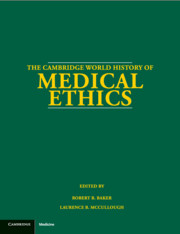Book contents
- Frontmatter
- PART I AN INTRODUCTION TO THE HISTORY OF MEDICAL ETHICS
- PART II A CHRONOLOGY OF MEDICAL ETHICS
- PART III DISCOURSES OF MEDICAL ETHICS THROUGH THE LIFE CYCLE
- PART IV THE DISCOURSES OF RELIGION ON MEDICAL ETHICS
- PART V THE DISCOURSES OF PHILOSOPHY ON MEDICAL ETHICS
- PART VI THE DISCOURSES OF PRACTITIONERS ON MEDICAL ETHICS
- 19 The Discourses of Practitioners in Africa
- 20 The Discourses of Practitioners in India
- 21 The Discourses of Practitioners in China
- 22 The Discourses of Practitioners in Japan
- 23 The Discourses of Practitioners in Ancient Europe
- 24 The Discourses of European Practitioners in the Tradition of the Hippocratic Texts
- 25 The Discourses of Practitioners in the Ninth- to Fourteenth-Century Middle East
- 26 The Discourses of Practitioners in Medieval and Renaissance Europe
- 27 The Discourses of Practitioners in Sixteenth- and Seventeenth-Century Europe
- 28 The Discourses of Practitioners in Eighteenth-Century France and Germany
- 29 The Discourses of Practitioners in Eighteenth-Century Spain
- 30 The Discourses of Practitioners in Eighteenth-Century Britain
- 31 The Discourses of Practitioners in Eighteenth-Century North America
- 32 The Discourses of Practitioners in Nineteenth- and Twentieth-Century France
- 33 The Discourses of Practitioners in Nineteenth- and Twentieth-Century Spain
- 34 The Discourses of Practitioners in Nineteenth- and Twentieth-Century Germany
- 35 The Discourses of Practitioners in Eighteenth- to Twentieth-Century Russia and Soviet Union
- 36 The Discourses of Practitioners in Nineteenth- and Twentieth-Century Britain and the United States
- 37 The Discourses of Practitioners in the Modern and Contemporary Islamic Middle East
- PART VII THE DISCOURSES OF BIOETHICS
- PART VIII DISCOURSES ON MEDICAL ETHICS AND SOCIETY
- Appendix: Biographies: Who Was Who in the History of Medical Ethics
- Bibliography
- Index
32 - The Discourses of Practitioners in Nineteenth- and Twentieth-Century France
from PART VI - THE DISCOURSES OF PRACTITIONERS ON MEDICAL ETHICS
Published online by Cambridge University Press: 28 May 2012
- Frontmatter
- PART I AN INTRODUCTION TO THE HISTORY OF MEDICAL ETHICS
- PART II A CHRONOLOGY OF MEDICAL ETHICS
- PART III DISCOURSES OF MEDICAL ETHICS THROUGH THE LIFE CYCLE
- PART IV THE DISCOURSES OF RELIGION ON MEDICAL ETHICS
- PART V THE DISCOURSES OF PHILOSOPHY ON MEDICAL ETHICS
- PART VI THE DISCOURSES OF PRACTITIONERS ON MEDICAL ETHICS
- 19 The Discourses of Practitioners in Africa
- 20 The Discourses of Practitioners in India
- 21 The Discourses of Practitioners in China
- 22 The Discourses of Practitioners in Japan
- 23 The Discourses of Practitioners in Ancient Europe
- 24 The Discourses of European Practitioners in the Tradition of the Hippocratic Texts
- 25 The Discourses of Practitioners in the Ninth- to Fourteenth-Century Middle East
- 26 The Discourses of Practitioners in Medieval and Renaissance Europe
- 27 The Discourses of Practitioners in Sixteenth- and Seventeenth-Century Europe
- 28 The Discourses of Practitioners in Eighteenth-Century France and Germany
- 29 The Discourses of Practitioners in Eighteenth-Century Spain
- 30 The Discourses of Practitioners in Eighteenth-Century Britain
- 31 The Discourses of Practitioners in Eighteenth-Century North America
- 32 The Discourses of Practitioners in Nineteenth- and Twentieth-Century France
- 33 The Discourses of Practitioners in Nineteenth- and Twentieth-Century Spain
- 34 The Discourses of Practitioners in Nineteenth- and Twentieth-Century Germany
- 35 The Discourses of Practitioners in Eighteenth- to Twentieth-Century Russia and Soviet Union
- 36 The Discourses of Practitioners in Nineteenth- and Twentieth-Century Britain and the United States
- 37 The Discourses of Practitioners in the Modern and Contemporary Islamic Middle East
- PART VII THE DISCOURSES OF BIOETHICS
- PART VIII DISCOURSES ON MEDICAL ETHICS AND SOCIETY
- Appendix: Biographies: Who Was Who in the History of Medical Ethics
- Bibliography
- Index
Summary
INTRODUCTION
The great watershed in the development and practice of medical ethics in modern France was World War Ⅱ. Prior to the war there was neither a legal nor informal régime of ethics that was uniformly enforced or voluntarily followed. Substantial disagreement existed about the nature of doctors’ obligations to one another, their patients, and to the state. All this changed during the Vichy regime that ruled France between 1940 and 1944. On October 7, 1940, in line with the corporatist ideals of the regime, a government-controlled Ordre des Médecins was founded with authority over licensing, discipline, and many of the details of medical education and practice. The new Ordre was retained following the defeat of the Germans, but was allowed more autonomy, including the legal enforcement of a written code of professional ethics, adopted by statute in 1947. For the first time in the history of French medicine, all doctors had a legal obligation to follow a standard body of ethical doctrine. It took a bit longer, as we shall see, for ethical principles themselves to change, but it was a momentous development in the practical moral orientation of French medicine.
Between the reorganization of French medicine during the French Revolutionary era and the brief reign of Marshall Petain, French doctors did not have a reliable body of ethical guidance.
- Type
- Chapter
- Information
- The Cambridge World History of Medical Ethics , pp. 418 - 426Publisher: Cambridge University PressPrint publication year: 2008
- 1
- Cited by



